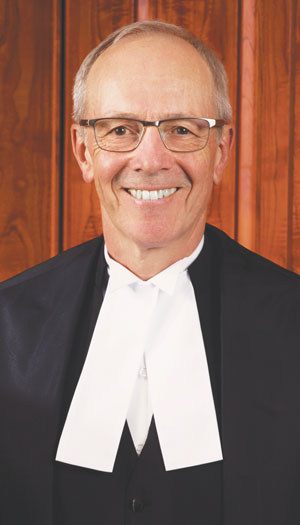As he settles into his new job, one of the biggest challenges facing Ontario Chief Justice George Strathy will be to improve efficiency in the province’s courts, lawyers say.

Cassels Brock & Blackwell LLP lawyer Christopher Horkins says he would like to see Strathy bring Ontario’s courts into the digital age.
“The biggest challenge, I think, will be how to bring technology into the courtroom, how to make better use of it, how to cut down on delays and make the processes simpler, easier, and cheaper,” says Horkins.
“I’m hopeful that [Strathy] is going to tackle that.”
Horkins says the appointment took him by surprise as Strathy’s name wasn’t among those rumoured for the job that had been vacant since former chief justice Warren Winkler’s retirement last December. “It was a surprise, but I think a good one,” says Horkins.
“I think he’s an excellent judge, very smart guy.”
Appellate lawyer Allan Rouben says he’s hoping for a focus on efficiencies in the civil justice system. “Picking up on the theme of early judicial involvement from
Hryniak v. Mauldin, it would be great to encourage Superior Court judges to adopt creative approaches to the scheduling of civil matters,” he says.
The courts should encourage judges to give out trial dates early in the process and use “more hybrid approaches to trials as is being done in the commercial list,” he adds.
While Strathy’s appointment came as a surprise to some, he did start out at a firm that has produced what seems like an unusually high number of prominent judges. After finishing law school at the University of Toronto, Strathy, whose first full day in the chief’s job was last Monday, articled at MacKinnon McTaggart in Toronto, a firm he estimates has seen the likes of about eight or nine judges, including former Ontario Court of Appeal associate chief justice Bert MacKinnon and other distinguished judges such as Justice Robert Sharpe of the appeal court and former Supreme Court of Canada justice Ian Binnie.
“It was a bit of a cradle for the judiciary,” says Strathy of the firm where he spent his early years of practice.
Strathy became chief justice after serving for just over a year at the Ontario Court of Appeal. He joined the appeal court in April 2013 after five years on the Ontario Superior Court bench in Toronto where he had a reputation for handling a good share of class action cases. Before that, he specialized in civil litigation with a particular emphasis on maritime and transportation law at Strathy & Isaacs in Toronto.
“It was a surprise,” he says of the June 13 announcement of the appointment by Prime Minister Stephen Harper.
“There were all sorts of really qualified people who were available as possibilities.”
He adds: “I was excited and delighted when it happened. It’s a great honour.”
Strathy, who was born in Toronto but then spent his early years in Montreal and later the Bahamas for a period of time, says he had a bit of luck as a judge when it came to handling a good portion of the class action files at Ontario’s Superior Court.
“I think as a result of that, I got some interesting, complex cases and had some prominent lawyers appearing in front of me,” he says, citing the overtime, Tim Hortons Inc. franchise, and
Green v. Canadian Imperial Bank of Commerce class actions as some of the major cases he handled during his time on the Superior Court bench.
As a Superior Court judge, “Justice Strathy was extremely thorough and hardworking and no doubt carried that over to the Court of Appeal,” says Rouben.
According to Horkins, Strathy has been “a very fair guy” during his time on the bench.
“He’s a respected judge on both sides,” he says.
“Having done some work in the class actions area, I know that he is respected by the plaintiff bar and the defence bar equally.”
As a lawyer, Strathy notes he also had some significant cases early in his career that took him to places such as the Supreme Court. Just six years in, for example, he acted
pro bono on an environmental law case that eventually reached the top court.
“It kind of demonstrated to me the significance of taking pro bono work and the significance of taking a chance,” he says.
As for his priorities in his new job, the married father of five daughters says he’ll be taking time to consult before deciding what they’ll be but notes access to justice is an obvious concern.
“I think everyone agrees that that is the paramount concern in the profession,” he says, noting the challenge of making progress at a time of budgetary constraints. “I think we just have to get creative in the area,” he says.
He adds it’s time to move from talking about what the problems are to finding solutions and getting results.
According to civil litigator James Morton, the new chief justice will face new challenges as well as some judges are openly criticizing government decisions and the public takes an increased interest in what they have to say.
For more, see "
Great judicial mediator set to retire."

 Cassels Brock & Blackwell LLP lawyer Christopher Horkins says he would like to see Strathy bring Ontario’s courts into the digital age.
Cassels Brock & Blackwell LLP lawyer Christopher Horkins says he would like to see Strathy bring Ontario’s courts into the digital age.